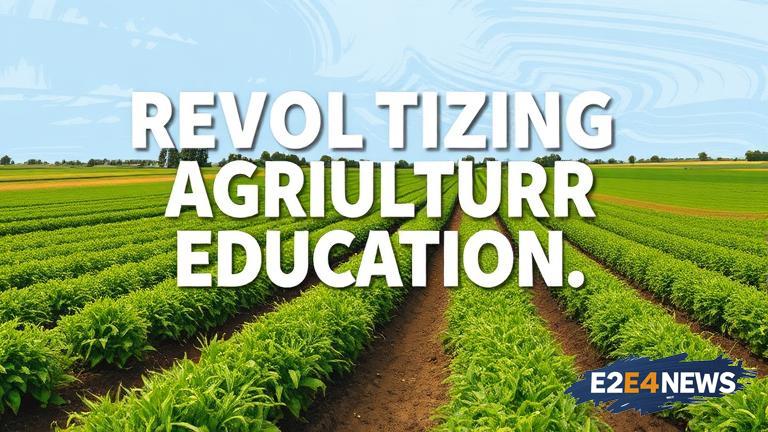The agricultural industry is at a critical juncture, with a growing need for skilled workers to meet the increasing demand for food production. Despite the importance of agriculture to the economy, the industry is facing a significant skills gap, with many students and young people lacking the necessary knowledge and training to pursue careers in agriculture. To address this issue, industry leaders are calling for a revolution in agricultural education, with a focus on providing students with practical, hands-on experience and training in the latest technologies and techniques. This includes the use of digital tools, such as precision agriculture and data analytics, as well as traditional skills like animal husbandry and crop management. By improving agricultural education, the industry can attract and retain more talented and motivated individuals, and ensure a sustainable future for food production. Furthermore, improved education and training can also help to address the growing issue of rural skills shortages, where many rural communities are struggling to find skilled workers to fill key roles. The industry is also urging for greater collaboration between educational institutions, industry organizations, and government agencies to develop and implement effective education and training programs. This includes the development of vocational training programs, apprenticeships, and other initiatives that provide students with practical experience and skills. Additionally, the industry is calling for greater investment in agricultural education, including funding for educational institutions, research and development, and industry-led training programs. By working together, the industry can ensure that the next generation of agricultural leaders and workers have the skills and knowledge needed to succeed in this critical sector. The importance of agricultural education cannot be overstated, as it plays a critical role in ensuring global food security, promoting sustainable agriculture practices, and supporting rural economic development. Moreover, the industry is facing significant challenges, including climate change, soil degradation, and water scarcity, which require skilled and knowledgeable workers to address. The use of technology, such as drones, satellite imaging, and precision agriculture, is also becoming increasingly important in agriculture, and workers need to have the skills to effectively use these tools. To address these challenges, the industry needs to attract and retain more talented and motivated individuals, and provide them with the necessary education and training to succeed. This includes providing students with a broad range of skills, including business management, marketing, and entrepreneurship, as well as technical skills like animal husbandry and crop management. The industry is also urging for greater recognition of the importance of agricultural education, including the development of national and international standards for agricultural education and training. By working together, the industry can ensure that agricultural education is given the recognition and support it deserves, and that the next generation of agricultural leaders and workers have the skills and knowledge needed to succeed. The benefits of improved agricultural education are numerous, including increased productivity, improved sustainability, and enhanced food security. Furthermore, improved education and training can also help to promote rural economic development, and support the growth of rural communities. The industry is also calling for greater investment in research and development, including the development of new technologies and techniques that can help to address the challenges facing agriculture. By investing in research and development, the industry can ensure that it remains at the forefront of innovation and technology, and that it is well-placed to address the challenges of the future. In conclusion, the agricultural industry is facing a critical skills gap, and urgent action is needed to address this issue. By improving agricultural education and training, the industry can attract and retain more talented and motivated individuals, and ensure a sustainable future for food production. The industry is calling for a revolution in agricultural education, with a focus on providing students with practical, hands-on experience and training in the latest technologies and techniques.





